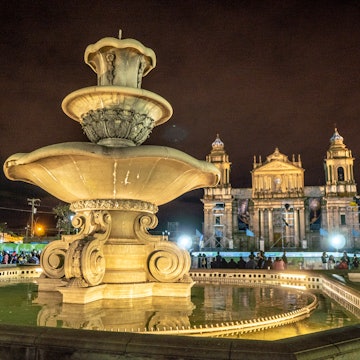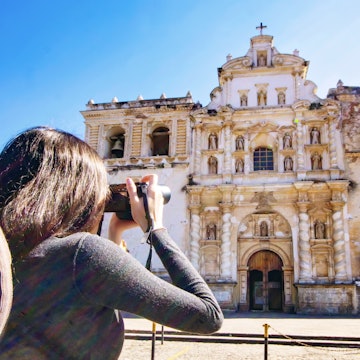

If you’re heading to Guatemala, it's probably a given that you’ll be going to Lago de Atitlán. The lake’s captivated pretty much everybody who has set eyes on it, from the ancient Maya to Aldous Huxley, the hippies of the 1970s to today’s world-weary flashpackers. What’s less clear is where to base yourself while soaking up the vibe. The shoreline is dotted with small towns and villages, each with its own personality. Here’s a quick rundown to help you find your own little corner of lakeside paradise.
Panajachel
In a nutshell: Shop hard during the day, party at night with the Guatemalans.
Vibe: With the best transport connections to Guatemala City and the most developed tourist infrastructure of all the lake towns, “Pana”, as it is often called, mainly hosts a mix of Guatemalan weekenders, tour groups and retiree expats. The main drag, Santander, can feel like a tourist trap, especially on weekends and national holidays, but midweek the pace slows right down.
Best for: Shopping, nightlife, restaurants, transport.
Don’t miss: Sunset drinks at one of the many lakeside cafes – the sight of the sun going down behind the volcanoes across the water is truly unforgettable.
Biggest turnoff: Aggressive street vendors.
Where to stay
On a budget: Mario’s Rooms. Simple, clean and friendly, this downtown hotel has been getting the thumbs up from budget travelers for years.
For a few quetzales more: Posada Los Encuentros. A charming little ecofriendly B&B right on the edge of town.
Treat yourself: Hotel Atitlán. Set in lovely grounds, rooms here feature sweeping lake views and all the comforts you’d expect for the price.
Santiago Atitlán
In a nutshell: Tradition and community in the lake’s biggest town.
Vibe: While the main street up from the lake is slowly filling with tourist businesses, Santiago remains very much a local affair – a bustling Guatemalan town with a mostly indigenous population.
Best for: Local life, observing traditional customs such as backstrap weaving and men in traditional dress, a rarity in modern Guatemala.
Don’t miss: A visit to Maximón, a Mayan/Christian deity who moves house each year. Ask around for the current location of his effigy, or tip some local kids a few quetzales to take you. Foreigners are welcome and offerings (cigarettes, liquor or candles) are appreciated.
Biggest turnoff: Limited accommodation options.
Where to stay
On a budget: Hotel Ratzán. A central location and simple, comfortable rooms make this the budget standout.
For a few quetzales more: Posada de Santiago. The American-owned Posada offers rustic-chic comfort, lovely grounds and stunning views in a quiet location on the edge of town.
Treat yourself: Hotel Bambú. Blending sustainability with luxury, Bambú has 10 rooms connected by pebbly paths in a lakefront setting.
San Pedro La Laguna
Vibe: Down by the waterfront San Pedro is very touristy (and attracts its fair share of international and Guatemalan hippies), but uphill the main part of town is a very traditional, typical Maya center.
Best for: Studying Spanish, volcano climbs, meeting other travelers.
Don’t miss: Hiking up San Pedro Volcano, which overlooks the town, for sweeping 360-degree panoramas.
Biggest turnoff: Drum circles outside your hotel window at 2am.
In a nutshell: Backpackers' stomping ground – come for a week, stay for a lifetime.

Where to stay
On a budget: Hostel Fe. This newcomer has raised the bar for budget accommodation in the area, with clean dorms, good doubles, a waterfront deck and even its own party boat.
For a few quetzales more: Mikaso Hotel. Colonial styling and great views from the rooftop bar and restaurant.
Treat yourself: We prefer Mikaso, but the pricier eco-friendly Hotel Sak'cari El Amanecer comes with an inviting pool.
San Marcos La Laguna
In a nutshell: You'll find yoga, massage and more in the lake’s most tranquil town.
Vibe: Extremely relaxed. The tourist area is mostly pedestrian-only, with footpaths winding through the coffee plantations.
Best for: New-age therapies, relaxation, alternative medicine, yoga and so on.
Don’t miss: Jumping off the purpose-built platform from the cliffside and into the lake – a 10-meter drop that is guaranteed to get your heart pumping!
Biggest turnoff: May be a little too relaxed for some.
Where to stay
On a budget: Hostel San Marcos. The one true hostel in town offers stone-floored dorms and rooms in a lush setting.
For a few quetzales more: Posada del Bosque Encantado. Charming, individually decorated rooms, a jungly garden and on-site temazcal (Mayan sauna).
Treat yourself: Lush Atitlan. Beautiful, quirky and stylish, with lake views from each room’s private balcony.
San Juan La Laguna
In a nutshell: The next big thing on the lake.
Vibe: San Juan is a mellow little place on the lake’s western shore. It’s just starting to appear on travelers’ radars and many old lake hands say this is what the rest of the lake was like way back before the crowds started arriving.
Best for: Observing daily village life, especially the local craft traditions. Also makes a good base for hikes and treks.
Don’t miss: A visit to one of the many weaving cooperatives in town,\ to see how the women create beautiful fabrics using the traditional backstrap loom.
Biggest turnoff: Limited tourist infrastructure.

Where to stay
On a budget: Hotel Pa Muelle. San Juan’s standout budget hotel offers clean, simple rooms in a fantastic setting.
For a few quetzales more: Hotel Chi-Yá. Sweet little lake-view cabins in a privileged location on the edge of town.
Treat yourself: Uxlabil Eco Hotel. Fantastic lake views, atmospheric rooms and a great on-site restaurant.
Other towns
The above is a list of the towns with the widest variety of accommodation options, but there are plenty of other places to stay on the lake, particularly if you’re looking for more seclusion:
Santa Cruz La Laguna A remote beauty home to a waterfront resort, which offers scuba diving in the lake, as well as a small but thriving local community.
Jaibalito A couple of cliff-top hotels, accessible by boat only.
San Lucas Tolimán Remote and rarely visited, wedged between the lake and a volcano.
San Antonio Palopó Easy to get to, but oddly ignored, this photogenic village is renowned for its women’s distinctive woven headdresses.
Getting around
For short hops between and within villages, tuk-tuks (three-wheeled motor taxis) are cheap and plentiful. There is a road around most of the lake, but the fastest and most atmospheric way to travel between towns is by boat – try to travel in the morning, as afternoon winds make the lake waters very choppy. You can walk between some towns, but the safety situation varies. Get reliable local advice before heading out and avoid carrying unnecessary valuables.
Getting there & away
Panajachel is the main transportation hub; it’s almost always best to go there to catch a boat to your final destination. Villages on the western shore are connected to the highway by pickup truck and the occasional bus. Shuttle services to nearly all of Guatemala are available from most villages, often with combinations for more distant destinations. As is the rule all over Guatemala, try to avoid traveling at night (decreased police patrols and animals wandering onto the highway are just two of the concerns) and only book transport and tours through reliable, established operators (and never on the street). In the rare or unlikely event that something does go wrong, you want to be travelling with someone who’s likely to take responsibility for their part of the problem.
This article was refreshed in August 2017.













